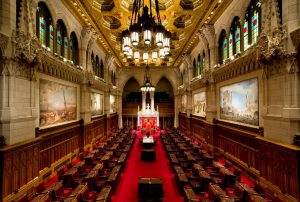Published:
2017-01-03
Moncton Times & Transcript
 It was refreshing to read your December 17 editorial, “Reform needed in Red Chamber”.
It was refreshing to read your December 17 editorial, “Reform needed in Red Chamber”.
Rarely does one hear about the need for a Triple-E Senate reform these days. Attention has shifted to the elusive topic of Senate “modernization” while awareness of the need for true Senate reform has all but been lost. As a Senator elected by Albertans and appointed by former Prime Minister Stephen Harper in 2012, I was initially optimistic that we would see substantive reform. To my surprise however, when I stood in the Senate to speak to the Harper government’s Bill C-7 (Senate Reform Act) on elections and term limits, I was roundly booed. It was apparent that this kind of “modernization” was not going to be supported by sitting Senators.
Later, I was asked to be part of the Senate special committee studying Senate modernization: aiming to make the Senate more effective but not delving into “equal or elected”. Such an assignment was important but did not deal with root problems so I declined the offer to join the committee.
I believe true Senate reform, which a majority of Canadians want, will only take place when premiers awaken to the need for elected senators and the media puts aside its skepticism about constitutional amendments. An amendment mandating the election of senators (and/or term limits) could be initiated by seven provinces representing 50 per cent of Canadians passing such legislation through their legislatures. These premiers would then sit together to “hammer out” a stand-alone constitutional amendment. No need for unanimity of all provinces, and no need for long, drawn-out constitutional negotiations.
The primary purpose of the Senate is to effectively represent and defend provincial, regional and minority interests. Its role is critical, and a Triple-E Senate reform is still the best model which will allow it to achieve these objectives. I applaud you for your acknowledgement of this.
Betty Unger
Senator (Alberta)

